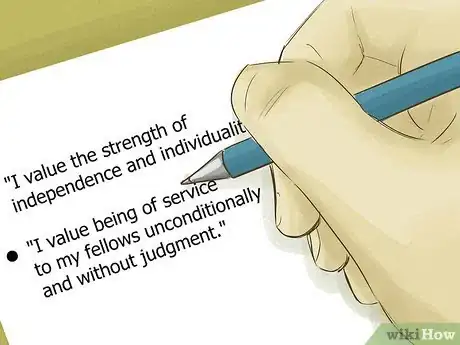This article was co-authored by Kim Chronister, PsyD. Dr. Kim Chronister is a Licensed Clinical Psychologist. She specializes in helping people struggling with substance abuse, relationship problems, eating disorders, and personality disorders. Dr. Chronister has contributed to and appeared on Access Hollywood, Investigation Discovery, and NBC News. She is the author of “Peak Mindset” and “FitMentality.” She holds an MA in Clinical Psychology and a Doctor of Psychology (PsyD) from Alliant International University.
There are 13 references cited in this article, which can be found at the bottom of the page.
This article has been viewed 17,766 times.
If you've been working hard but seeing very few positive results from your efforts, you may feel like giving up on your life. Whether this is happening in your relationships, career, or personal growth, banging your head up against the wall gets old. Eventually, you start to feel like you should just stop trying at all. If you've gotten to this point in life, things can improve for you. By redefining your purpose, generating motivation, and cultivating a positive outlook, you can start to fall in love with your life again.
Steps
Redefining Your Purpose
-
1Live like there is no tomorrow. However cliche this statement may be, it holds some truth. Living with the idea that your time is limited can motivate you to accomplish your goals and cultivate gratitude for the beauty in life. Adopting this attitude can also give you insight into the things that are important to you.[1]
- Ask yourself, "If I only had one year left, what would I want to accomplish?"
-
2Define your personal values. Develop a personal mission statement that works according to your values. Stating who you are to the world—and to yourself—is one of the first steps to finding inner peace and happiness, which will likely make you want to keep going.[2]
- You can take this one step further by completing an online inventory to determine your core values. Such assessments, like the one from the Barrett Values Centre, are designed to help you get a better sense of the variables driving your goals and decision-making.[3]
Advertisement -
3Make sure you are doing your life's work. Ask yourself, “How do I want to be remembered? Am I doing the work I want to be remembered by?” The answer to these questions will probably lead you to knowing what your life's work. Once you know this, you can take the necessary steps to get yourself there, which can ultimately give you a goal and something to work on.[4]
- Don't mistake your life's work for work in general. Your job or occupation does not necessarily have to be your life's work. This is the work that allows you to share your talents, strengths, and experiences with others to improve the world around you. For some, parenting may be their life's work. For others, it may be starting a business or encouraging other's to start a business. It really depends on you.
- You can discover your life's work by paying attention to the things you are naturally good at, the things you absolutely enjoy doing. What can't you go without doing? Thinking about such activities can help you discover your life's work and give you a reason to go on.[5]
-
4Set realistic goals and move toward them daily. Adjust your expectations for life. Putting too much pressure on yourself is a sure way to not only experience failure, but to make you feel bad about yourself. It's OK if you have to scale back on your daily goals; doing so doesn't mean that you won't reach your ultimate goals. You'll just find a more realistic way to get there.
- Start by defining smart goals. That is, those that are specific, measurable, attainable, realistic, and time-bound.
- For instance, you might say “I want to go back to school.” You will need to come up with a way to measure you progress towards this goal, determine if it is attainable and realistic for you, and set a deadline for reaching it.
- Try writing down your goals, too. Studies show that people write their goals down have more success actually completing them.[6]
Finding Motivation
-
1Leverage your strengths. Make your strengths work for you by determining what they are, and then taking advantage of them. Using what you have going for you is an easy way to achieve your goals, and feel more motivated about the future.
- For instance, if you know that your ability to talk to anyone is one of your strengths, use it when you are feeling particularly lonely: chat up someone at the grocery store or gym.[7]
-
2Visualize your end goal. Keep in your mind the picture of the end result. Seeing an image of what you are working on is excellent motivation to keep going. Whenever you want to quit, ask yourself, do you want to feel the thrill of victory or the agony of defeat? Most likely, you'll want to know what it feels like to achieve your goal.[8]
- Spend time every day envisioning your goals. Think about where you are, what you are doing, and how you feel now that your goal has been achieved. Envision this with as much detail as possible.
- For example, if you are interested in losing weight and gaining more confidence, you would imagine yourself as thinner and healthier. See the foods you eat. Visualize getting sweaty during your workouts. Think about the compliments you'll get from friends and family. Envisioning how you'll feel can help propel you forward and keep you on track.
-
3Celebrate small wins. Break major goals down into smaller milestones. Doing so reduces fear, clarifies direction, and increases the probability of early successful outcomes.
- Buy yourself something nice when you've worked out for a week in a row, or take yourself to dinner when you are half-way to your goal. Celebrating these victories keeps you motivated and helps you feel good about your achievements.[9]
- If you can, try to reward yourself in a healthy way on a daily or weekly basis![10]
-
4Look at the problem in a new way. Understand that the solution you had in mind may not be the correct one, but there is always another way to solve the problem. Know that there is always a way out, but it is up to you to find it.[11]
- For example, if you want to go back to school, but can't with a full-time job, consider ways you can cut back hours at work or take online classes.
-
5Don't make excuses. Avoid making excuses like “I'm not in the mood today” or “I need to sort out my love life first.” The reality is that there will never be a perfect time to start working on a goal. Take action now![12]
- Always keep in mind that your time is limited. If you have a dream or goal, don't put it off until tomorrow, because tomorrow may never come.
- Try making a list of things that motivate and excite you. Then, add more of these activities to your daily schedule.[13]
Building a Healthy Mindset
-
1Stop playing the role of victim. When you blame others or societal institutions for your problems, you take away your power, making it harder to accomplish your goals. Instead, take responsibility for your actions. Focus on how you can respond to a given situation and the factors that you can control.[14]
- While unfairness and difficult people can make life more challenging, they shouldn't leave you powerless. Move on from perceived injustices, and think about how you can overcome or address them.
-
2Kick negative self-talk to the curb. Know that comparing yourself to others and thinking negatively about yourself is detrimental and a waste of time and energy. When you start to feel yourself getting down, take time to think of the positives about yourself.
- You may want to write them down and pull them back out whenever your thoughts turn crappy. Focusing on the positive instead of the negative can help you realize you have something to live for.[15]
- For instance, negative talk is that which makes you feel bad or does not serve to improve your situations, like "I'm such a loser." On the other hand, positive self-talk lifts your mood and motivates you, such as "I'm not where I want to be, but I have come a long way. I can do this." Try to put a positive spin on things when you find yourself thinking negatively.
-
3Love yourself and others. Approach the world with an attitude of love. Start by practicing self love. Identify your best features and learn to love them. Then, do the same for others.
- Love attracts love. If you send love out into the world, you'll likely get love back.
-
4Do activities that you love regularly. Engage in something that you enjoy on a daily basis. Something as simple as cooking a meal or playing with your dog can provide you with small moments of satisfaction. Taking time out to do something just for you that gives you pleasure can make a huge difference in your mood and mindset about your life.[16]
-
5Make use of social support. Schedule a standing date with a friend or family member to go out together. Getting out of the house and socializing with others is a great way to make yourself feel better.
- When you make plans with others, they can hold you accountable, as well, so it will be more difficult to cancel. If you don't have anyone to hang out with, go to a coffee shop or similar place by yourself. Challenge yourself to make eye contact and start a conversation with a stranger. You never know, you may make friends.
-
6Nurture your body. Commit to a healthy way of life. The better you treat your body, the better it will feel. This, in turn, can make you feel better about yourself. Eating nutrient-rich food and exercising can enhance your appearance, and ultimately, improve your self-image. Additionally, getting enough sleep can help you feel better, both physically and mentally. Your body is your temple: treat it as such.[17]
-
7Be grateful. Make a list of everything in your life that you are thankful for when life starts to get you down. When you focus on what you have to be grateful for, tasks that seem overwhelming can take on a new light. When you take on an attitude of gratitude, you may be surprised with how your life can change for the better.[18]
-
8Turn to your spirituality. Practice something every day that helps you get in touch with your spirituality. Spending time daily doing this can make you feel stronger in your faith, and uplift your soul.[19]
- Spiritual practice can include anything you find inspiring, including meditating, praying, spending time on devotions, taking a nature walk or attending a meeting with others who share your beliefs.
Expert Q&A
-
QuestionHow can I increase my motivation in life?
 Kim Chronister, PsyDDr. Kim Chronister is a Licensed Clinical Psychologist. She specializes in helping people struggling with substance abuse, relationship problems, eating disorders, and personality disorders. Dr. Chronister has contributed to and appeared on Access Hollywood, Investigation Discovery, and NBC News. She is the author of “Peak Mindset” and “FitMentality.” She holds an MA in Clinical Psychology and a Doctor of Psychology (PsyD) from Alliant International University.
Kim Chronister, PsyDDr. Kim Chronister is a Licensed Clinical Psychologist. She specializes in helping people struggling with substance abuse, relationship problems, eating disorders, and personality disorders. Dr. Chronister has contributed to and appeared on Access Hollywood, Investigation Discovery, and NBC News. She is the author of “Peak Mindset” and “FitMentality.” She holds an MA in Clinical Psychology and a Doctor of Psychology (PsyD) from Alliant International University.
Clinical Psychologist Be conscious of what you put on in the morning. Believe it or not, there's a term called "enclothed cognition," which means that you wear affects your motivation and performance.
Be conscious of what you put on in the morning. Believe it or not, there's a term called "enclothed cognition," which means that you wear affects your motivation and performance. -
QuestionHow do you stay calm in difficult times?
 Kim Chronister, PsyDDr. Kim Chronister is a Licensed Clinical Psychologist. She specializes in helping people struggling with substance abuse, relationship problems, eating disorders, and personality disorders. Dr. Chronister has contributed to and appeared on Access Hollywood, Investigation Discovery, and NBC News. She is the author of “Peak Mindset” and “FitMentality.” She holds an MA in Clinical Psychology and a Doctor of Psychology (PsyD) from Alliant International University.
Kim Chronister, PsyDDr. Kim Chronister is a Licensed Clinical Psychologist. She specializes in helping people struggling with substance abuse, relationship problems, eating disorders, and personality disorders. Dr. Chronister has contributed to and appeared on Access Hollywood, Investigation Discovery, and NBC News. She is the author of “Peak Mindset” and “FitMentality.” She holds an MA in Clinical Psychology and a Doctor of Psychology (PsyD) from Alliant International University.
Clinical Psychologist Think about finding a therapist or life coach. You can also try bibliotherapy, which is where you read your therapy. In fact, certain books about positive psychology can provide strategies for contentment and de-stressing.
Think about finding a therapist or life coach. You can also try bibliotherapy, which is where you read your therapy. In fact, certain books about positive psychology can provide strategies for contentment and de-stressing.
References
- ↑ https://www.psychologytoday.com/blog/prescriptions-life/201008/how-would-you-live-if-you-only-had-365-days-left
- ↑ http://bigthink.com/experts-corner/6-keys-to-transform-your-life-by-cultivating-self-love
- ↑ https://www.valuescentre.com/our-products/products-individuals/personal-values-assessment-pva
- ↑ https://www.psychologytoday.com/blog/hope-relationships/201311/redefining-your-purpose
- ↑ http://www.huffingtonpost.com/michael-thomas-sunnarborg/six-tips-for-finding-your_b_12337420.html
- ↑ Kim Chronister, PsyD. Clinical Psychologist. Expert Interview. 28 July 2021.
- ↑ http://www.health.harvard.edu/mind-and-mood/leverage-your-strengths-for-a-more-positive-life
- ↑ http://www.lifehack.org/articles/communication/7-things-when-you-want-give.html
- ↑ https://www.entrepreneur.com/article/246817
- ↑ Kim Chronister, PsyD. Clinical Psychologist. Expert Interview. 28 July 2021.
- ↑ http://elitedaily.com/life/motivation/7-reasons-you-should-never-give-up-on-life/628482/
- ↑ https://www.psychologytoday.com/blog/better-perfect/201703/11-ways-overcome-procrastination
- ↑ Kim Chronister, PsyD. Clinical Psychologist. Expert Interview. 28 July 2021.
- ↑ https://www.psychologytoday.com/blog/communication-success/201411/how-stop-blaming-others-and-be-free-and-powerful
- ↑ http://storylineblog.com/2015/10/20/love-your-life/
- ↑ https://www.psychologytoday.com/blog/hope-relationships/201311/redefining-your-purpose
- ↑ http://bigthink.com/experts-corner/6-keys-to-transform-your-life-by-cultivating-self-love
- ↑ http://www.lifehack.org/articles/communication/7-things-when-you-want-give.html
- ↑ http://bigthink.com/experts-corner/6-keys-to-transform-your-life-by-cultivating-self-love







































































